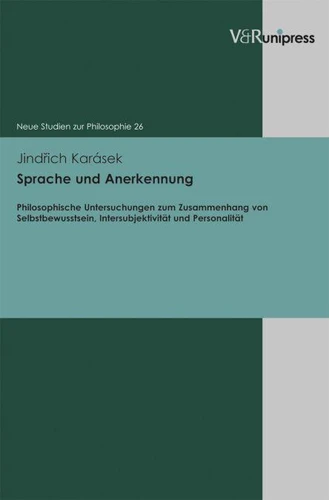Sprache und Anerkennung. Philosophische Untersuchungen zum Zusammenhang von Selbstbewusstsein, Intersubjektivität und Personalität
Par : , , , ,Formats :
Disponible dans votre compte client Decitre ou Furet du Nord dès validation de votre commande. Le format PDF est :
- Compatible avec une lecture sur My Vivlio (smartphone, tablette, ordinateur)
- Compatible avec une lecture sur liseuses Vivlio
- Pour les liseuses autres que Vivlio, vous devez utiliser le logiciel Adobe Digital Edition. Non compatible avec la lecture sur les liseuses Kindle, Remarkable et Sony
 , qui est-ce ?
, qui est-ce ?Notre partenaire de plateforme de lecture numérique où vous retrouverez l'ensemble de vos ebooks gratuitement
Pour en savoir plus sur nos ebooks, consultez notre aide en ligne ici
- Nombre de pages288
- FormatPDF
- ISBN978-3-86234-846-6
- EAN9783862348466
- Date de parution17/08/2011
- Protection num.pas de protection
- Taille2 Mo
- Infos supplémentairespdf
- ÉditeurV&R Unipress
Résumé
The problem of intersubjectivity or the problem of other minds is one of the most discussed philosophical problems in philosophy of the 20th century. In this century different solutions of this problem have been developed, not only in phenomenology and in critical theory, but also in analytical philosophy. In these approaches the philosophy of German idealism has been almost forgotten, despite the fact that in German idealism the problem of intersubjectivity was formulated for the first time in the history of philosophy.
Through analysis of the texts of the German idealists, and through discussion of analytical philosophers, this book attempts to show that intersubjectivity is, for the philosophy of German idealism, in no way an epiphenomenon of self-consiousness, but rather an immanent part of self-consciousness, and therefore the way in which German idealism deals with this problem can be inspiring for its philosophical reflexion.
Through analysis of the texts of the German idealists, and through discussion of analytical philosophers, this book attempts to show that intersubjectivity is, for the philosophy of German idealism, in no way an epiphenomenon of self-consiousness, but rather an immanent part of self-consciousness, and therefore the way in which German idealism deals with this problem can be inspiring for its philosophical reflexion.
The problem of intersubjectivity or the problem of other minds is one of the most discussed philosophical problems in philosophy of the 20th century. In this century different solutions of this problem have been developed, not only in phenomenology and in critical theory, but also in analytical philosophy. In these approaches the philosophy of German idealism has been almost forgotten, despite the fact that in German idealism the problem of intersubjectivity was formulated for the first time in the history of philosophy.
Through analysis of the texts of the German idealists, and through discussion of analytical philosophers, this book attempts to show that intersubjectivity is, for the philosophy of German idealism, in no way an epiphenomenon of self-consiousness, but rather an immanent part of self-consciousness, and therefore the way in which German idealism deals with this problem can be inspiring for its philosophical reflexion.
Through analysis of the texts of the German idealists, and through discussion of analytical philosophers, this book attempts to show that intersubjectivity is, for the philosophy of German idealism, in no way an epiphenomenon of self-consiousness, but rather an immanent part of self-consciousness, and therefore the way in which German idealism deals with this problem can be inspiring for its philosophical reflexion.



